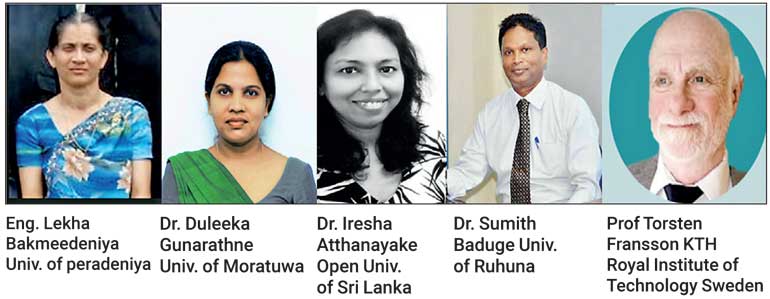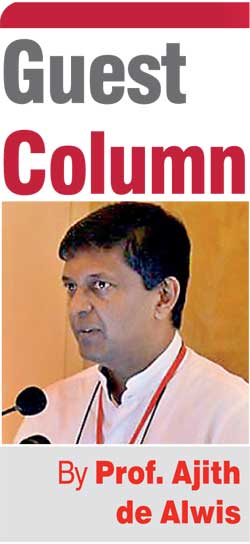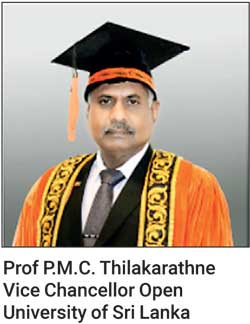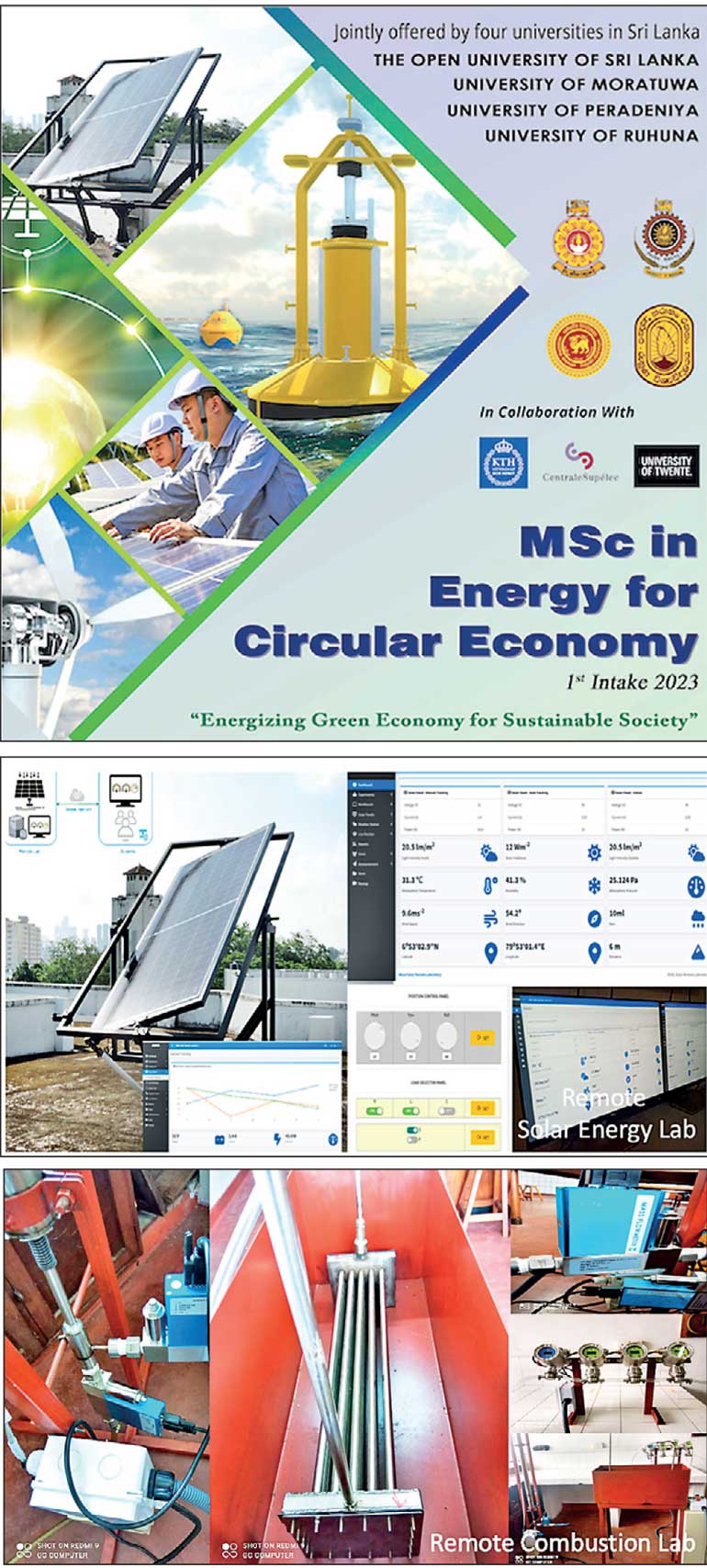Thursday Feb 19, 2026
Thursday Feb 19, 2026
Thursday, 30 March 2023 00:38 - - {{hitsCtrl.values.hits}}

On 30 March at BMICH the MSc program in Energy for Circular Economy which is the main outcome of EUSL Energy project (Europe Sri Lanka Capacity Building in Energy Circular Economy) was launched and it is indeed a first in many ways. It is an educational program for the energy transition and an economy transition as well. Twin areas of Renewable Energy and Circular Economy are cornerstones of this Master’s program. Open University of Sri Lanka is leading the program implementation. A study program that promotes the circular economy towards a de-carbonised energy system including raw materials and waste.
As Sri Lanka is looking towards renewing itself from a chaotic economic situation that has brought it down to its knees this pathway perhaps is the most apt and fitting. A system change is required and these are the prescriptions to ensure future fit anyway. While many economies may have to look at transitioning from perhaps a reasonably functioning economy Sri Lanka does not need the dismantling part to be played!
 Sri Lanka is facing a polycrisis situation and in the centre of that is the energy crisis. An ageing hydroelectric sector, an old coal plant which at many a times goes off than on, and a less than optimally managed transport sector which ranks first in terms of contribution to our contribution to climate change. On top of this a serious lack of currency especially the greenback is making us to count ships with coal, crude, gas and oil coming and parking themselves outside the harbour till payments are made before discharging our energy requirement.
Sri Lanka is facing a polycrisis situation and in the centre of that is the energy crisis. An ageing hydroelectric sector, an old coal plant which at many a times goes off than on, and a less than optimally managed transport sector which ranks first in terms of contribution to our contribution to climate change. On top of this a serious lack of currency especially the greenback is making us to count ships with coal, crude, gas and oil coming and parking themselves outside the harbour till payments are made before discharging our energy requirement.
When you do not have energy, you have no option in doing anything and we have had direct exposure to this reality. Yet it is strange to observe sun shining for more than 12 hours and rain that pours down incessantly at times. Our dry zone is perhaps still an envy of those who would gladly classify those regions as wet zone when considering their meagre rainfalls. Of course, not learning from those who admonished that not a drop should flow to the sea without not getting any work done – wonder he knew the concept of circular economy – we are almost at sea in realising benefits of these resources. Of course, floods affect us and the sun dehydrates us and the impacts are more in that way.
While families have earned their Nobel prizes in demonstrating physics of light and moved on to harness solar energy even when they have few rays per day, we have not lifted a finger to start using the top-grade silicon quartz in producing solar cells. That would have been a single investment that would have allowed so much to happen. Now all these opportunities require forward thinking leaders with knowledge. In some quarters where there are the learned we find themselves excelling using the old know-how. This century will demand constant learn-unlearn-learn. An ability to learn is a prerequisite for employment.
Heralding renewables is not just about buying a solar cell from overseas along with all the other goods and thinking that we would be going net zero and all that. We need a work force conversion fast. Projects in renewables are only linked with conspiracy theories in Sri Lanka like many others. Engagement in such discourses basically gets us nowhere. The sun would rise from the east and set from west and the country only would go bust and that has already happened. Launching a new and a different learning opportunity with action engagements built-in would make EUSL-Energy a different donor project. It embodies the EU EIT methodology of student-centred education, innovation and entrepreneurship perspective and planned to be a study program with a real difference.
Four university staff in four national universities have worked with three universities in EU to develop a program of study that is a first of such types for Sri Lanka and centred on Energy in Circular Economy. KTH Royal Institute of Technology (Sweden), CentraleSupelec (France), University of Twente (Netherlands) join Open University of Sri Lanka, Universities of Peradeniya, Moratuwa and Ruhuna in developing the program which is what got launched on the 30th with the first intake. The learning modules are hosted on the global Learnify repository. This will also be the first time that challenge-based education is embedded into the Sri Lankan universities and what better field than energy to start that!
 As this has been a co-working of seven universities this is also the first time that four universities from the country have worked together for a common goal. The students who joined in on the 30th have the opportunity of learning from faculty from different universities – and in different locations. Lots of firsts and all for the good!
As this has been a co-working of seven universities this is also the first time that four universities from the country have worked together for a common goal. The students who joined in on the 30th have the opportunity of learning from faculty from different universities – and in different locations. Lots of firsts and all for the good!
Circular Economy, Renewable energies, Energy Management and Industrial Energy are at the heart of this study program. The kind of economy that we all should aspire in these challenging times is a circular economy and that is what is fit for the future. The combination of renewable energy systems with circular economy is perhaps exactly the right medicine for our ills of today. The program is modular and is possible in distance mode. The concept of the distance program of study program started well before COVID made such learning modes the most feasible and a dominant mechanism. Prof. Torsten Fransson, Emeritus Professor of KTH, spearheaded the mammoth task of building teams, ensuring the framework program build won the confidence of the European Union funders. He was also the architect of the program. EUSL-Energy is an Erasmus + funded program.
Being a distance learning with opportunities in in-campus learning and experimentation the program has much variety. Students will get access to a much broader and diversified view of the energy sector. The partner EU universities are going to be with the program and there is the possible engagement with resource personnel from all these universities. Hence the students will have access to learning modules that do not presently exist in the country.
One of the most interesting developments in this study program are the development of remote labs. All local universities have developed remote labs catering to the program and the first four labs are on solar, wind, wave and combustion. A student can engage in an experiment from home or from his workplace. When EUSL-Energy program development started the COVID forcing function to embrace distance and virtual learning was not present. The program developers such as Prof Torsten and the Sri Lankan academics were with the thinking that the education in the 21st century had to have these elements in place if we are to build the workforce to support the emerging conditions as well as accelerate the transition. Now COVID almost normalised this form of engagement in education and the EUSL-Energy can enjoy the head start it had in developing the program.
The four virtual labs in the four local universities are already established to initiate the program and they will go through further development and could serve in many more ways in future. The students will receive an Industry 4.0 learning experience. The other perhaps even more important element is challenge based education. As this is geared to practice and transformation and also welcome those from industry an example of a couple of challenges or part thereof may be how do you convert Norochcholai Coal Power Station to switch to Biomass or RDF derived from waste, how excess wind energy in Mannar can be used to convert to Green Ammonia, etc. Now the problem solving requires getting to know many areas and the resource personnel of the study program would guide the individuals to self-learn and grow themselves. You learn through problem solving – the STEM approach.
Around 120 students have already enrolled to follow this Master’s program and it is an encouragement. The coming together of seven universities in four countries have led to the development of a course which has real relevance to Sri Lanka at this time. The decision makers who are looking at human capital requirement for the economic transition should value this development and must take steps to factor in the potential outputs to their plans. Otherwise, what usually happens with our higher education of serving someone elsewhere could well take place from this development as well.
